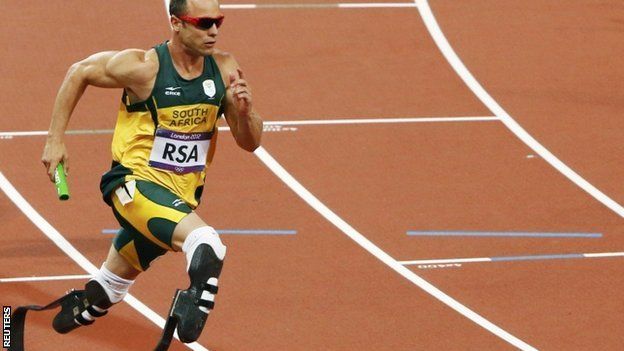Oscar Pistorius: IPC will allow him to compete at Rio Paralympics
- Published

IPC spokesman Craig Spence says of Pistorius: "Providing he serves his sentence then he will be free to compete in IPC competitions"
Oscar Pistorius will be allowed to compete at the 2016 Paralympic Games if he is not in jail, the International Paralympic Committee has revealed.
The South African, 27, was found guilty of culpable homicide on Friday after the judge ruled he killed his girlfriend Reeva Steenkamp by mistake.
Sentencing will take place on 13 October, but Pistorius could compete at Rio if he has served his sentence.
Oscar Pistorius could still compete at Rio Paralympics
"We wouldn't stand in his way," said IPC spokesman Craig Spence.
Pistorious, nicknamed Blade Runner, won six gold medals at three Paralympic Games and made history by becoming the first amputee sprinter to compete at the Olympics.
IPC director of media and communications Spence said that the organisation's thoughts were with the family and friends of Steenkamp.
But he said the IPC would not block Pistorius if he had served his sentence and wanted to compete at Rio.
"Providing he serves his sentence then he will be free to compete in IPC competitions going forward," Spence told BBC chief sports correspondent Dan Roan.
"Oscar would need to decide first whether he wanted to compete and then he would need to be selected by the South African National Paralympic Committee.
Pistorius won his first of six Paralympic gold medals at Athens in 2004
"If he had served any punishment given to him before Rio then the ball would be in his court."
But former Paralympian Baroness Tanni-Grey Thompson doubts whether Pistorius would make the Games - even if he had served his punishment and was picked to represent South Africa.
"He'll have missed a chunk of time training and competing," added the 11-time Paralympic gold medallist.
"His sponsors aren't there anymore…financially he's in a very difficult position."
Pistorius's early life |
|---|
Pistorius had his lower legs amputated at the age of 11 months, having been born without a fibula in either leg |
By the age of two, Pistorius had his first pair of prosthetic legs and within days he had mastered them |
He played waterpolo and rugby in secondary school. He also played cricket, tennis, took part in triathlons and Olympic club wrestling and was an enthusiastic boxer |
In June 2003, he shattered his knee playing rugby and on the advice of doctors took up track running to aid his rehabilitation |
Meanwhile, IPC chief executive Xavier Gonzalez is confident Pistorius's conviction will not harm the profile of the Paralympic movement.
"The trial has had no negative impact on the Paralympic movement," he added.
"Since London and Sochi 2014 we have seen an incredible growth in all aspects of our activities and we are looking forward positively to Rio and Pyeongchang.
"Oscar was a fundamental ambassador of the Paralympic movement in the period between 2008 and 2012.
"Since then the Paralympic movement has many other ambassadors and many other athletes that have been recognised globally."
Watch Oscar Pistorius: Blade Runner on the BBC News Channel at 21:30 BST on Saturday, 13 September and Sunday, 14 September.
- Published12 September 2014
- Published12 September 2014
- Published12 September 2014
- Published5 September 2016